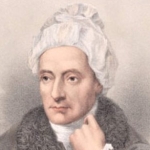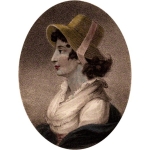I.1.
Awake, Æolian lyre, awake,
And give to rapture all thy trembling strings.
From Helicon's harmonious springs
A thousand rills their mazy progress take:
The laughing flowers, that round them blow,
Drink life and fragrance as they flow.
Now the rich stream of music winds along
Deep, majestic, smooth, and strong,
Thro' verdant vales, and Ceres' golden reign:
Now rolling down the steep amain,
Headlong, impetuous, see it pour:
The rocks and nodding groves rebellow to the roar.
I.2.
Oh! Sovereign of the willing soul,
Parent of sweet and solemn-breathing airs,
Enchanting shell! the sullen Cares
And frantic Passions hear thy soft control.
On Thracia's hills the Lord of war,
Has curb'd the fury of his car,
And dropp'd his thirsty lance at thy command.
Perching on the sceptred hand
Of Jove, thy magic lulls the feather'd king
With ruffled plumes and flagging wing:
Quench'd in dark clouds of slumber lie
The terror of his beak, and light'nings of his eye.
I.3.
Thee the voice, the dance, obey,
Temper'd to thy warbled lay.
O'er Idalia's velvet-green
The rosy-crowned Loves are seen
On Cytherea's day
With antic Sports and blue-ey'd Pleasures,
Frisking light in frolic measures;
Now pursuing, now retreating,
Now in circling troops they meet:
To brisk notes in cadence beating
Glance their many-twinkling feet.
Slow melting strains their Queen's approach declare:
Where'er she turns the Graces homage pay.
With arms sublime, that float upon the air,
In gliding state she wins her easy way:
O'er her warm cheek and rising bosom move
The bloom of young Desire and purple light of love.
II.1.
Man's feeble race what ills await,
Labour, and Penury, the racks of Pain,
Disease, and Sorrow's weeping train,
The fond complaint, my song, disprove,
And justify the laws of Jove.
Say, has he giv'n in vain the heav'nly Muse?
Night, and all her sickly dews,
Her spectres wan, and birds of boding cry,
He gives to range the dreary sky:
Till down the eastern cliffs afar
Hyperion's march they spy, and glitt'ring shafts of war.
II.2.
In climes beyond the solar road,
Where shaggy forms o'er ice-built mountains roam,
The Muse has broke the twilight-gloom
To cheer the shiv'ring native's dull abode.
And oft, beneath the od'rous shade
Of Chili's boundless forests laid,
She deigns to hear the savage youth repeat
In loose numbers wildly sweet
Their feather-cinctur'd chiefs, and dusky loves.
Her track, where'er the goddess roves,
Glory pursue, and generous Shame,
Th' unconquerable Mind, and Freedom's holy flame.
II.3.
Woods, that wave o'er Delphi's steep,
Isles, that crown th' Ægean deep,
Fields, that cool Ilissus laves,
Or where Mæander's amber waves
In ling'ring Lab'rinths creep,
How do your tuneful echoes languish,
Mute, but to the voice of Anguish?
Where each old poetic mountain
Inspiration breath'd around:
Ev'ry shade and hallow'd Fountain
Murmur'd deep a solemn sound:
Till the sad Nine in Greece's evil hour
Left their Parnassus for the Latian plains.
Alike they scorn the pomp of tyrant power,
And coward Vice, that revels in her chains.
When Latium had her lofty spirit lost,
They sought, O Albion! next thy sea-encircled coast.
III.1.
Far from the sun and summer-gale,
In thy green lap was Nature's darling laid,
What time, where lucid Avon stray'd,
To him the mighty mother did unveil
Her awful face: the dauntless child
Stretch'd forth his little arms, and smiled.
This pencil take (she said) whose colours clear
Richly paint the vernal year:
Thine too these golden keys, immortal boy!
This can unlock the gates of joy;
Of Horror that, and thrilling Fears,
Or ope the sacred source of sympathetic tears.
III.2.
Nor second he, that rode sublime
Upon the seraph-wings of Ecstasy,
The secrets of th' Abyss to spy.
He pass'd the flaming bounds of Place and Time:
The living throne, the sapphire-blaze,
Where angels tremble, while they gaze,
He saw; but blasted with excess of light,
Clos'd his eyes in endless night.
Behold, where Dryden's less presumptuous car,
Wide o'er the fields of Glory bear
Two coursers of ethereal race,
With necks in thunder cloth'd, and long-resounding pace.
III.3.
Hark, his hands thy lyre explore!
Bright-eyed Fancy hovering o'er
Scatters from her pictur'd urn
Thoughts that breathe, and words that burn.
But ah! 'tis heard no more—
O lyre divine, what daring spirit
Wakes thee now? tho' he inherit
Nor the pride, nor ample pinion,
That the Theban Eagle bear,
Sailing with supreme dominion
Thro' the azure deep of air:
Yet oft before his infant eyes would run
Such forms, as glitter in the Muse's ray
With orient hues, unborrow'd of the Sun:
Yet shall he mount, and keep his distant way
Beyond the limits of a vulgar fate,
Beneath the good how far—but far above the great.




















Comment form: